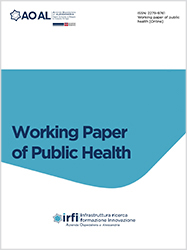Promoting research and innovation: analysis of the first mapping of the organization and research activities of Piedmont's Health Authorities
All claims expressed in this article are solely those of the authors and do not necessarily represent those of their affiliated organizations, or those of the publisher, the editors and the reviewers. Any product that may be evaluated in this article or claim that may be made by its manufacturer is not guaranteed or endorsed by the publisher.
Authors
Health research, regarded as an integral component of the National Health Service (NHS), is essential for ensuring an efficient healthcare system that meets the country’s actual care and assistance needs. The Piedmont Region recognizes health and biomedical research as crucial for its strategic development. The Regional Resolution No. 40-4801 of March 18, 2022, outlined the key role of the Research and Innovation Department (DAIRI) in supporting the Piedmont Region in the governance of research activities. In line with this resolution, a need emerged to conduct a comprehensive mapping of research activities carried out within the Regional Healthcare Authorities (RHAs).
The survey, referring to the year 2021, was completed online via the web-based REDCap platform by all 18 RHAs in Piedmont. The mapping revealed the activation of 1193 new clinical studies, the publication of 2476 scientific articles in indexed and/or impact-factor journals, the finalization of 341 research collaborations, and the funding of 99 projects, including 15 European ones. Furthermore, the survey highlighted a heterogeneous landscape of research infrastructures, with a predominance of facilities dedicated to the activation and management of clinical trials (61%) and the administrative management of research (67%). Biobanks were identified as the least represented infrastructure, present in only 17% of RHAs.
These findings underline the necessity for a more coordinated and integrated approach to strengthen health research in the region. The mapping of organizational structures and scientific activities within the ASRs, conducted for the first time by the Piedmont Region through DAIRI, underscored the growing importance of centralizing and coordinating research and innovation efforts within the Regional Health System. However, for these efforts to produce tangible and sustainable outcomes, a robust institutional framework is essential. Institutionalizing health research at the regional level through specific legislation could provide the necessary direction to ensure the long-term sustainability of these efforts.
How to Cite

This work is licensed under a Creative Commons Attribution-NonCommercial 4.0 International License.







